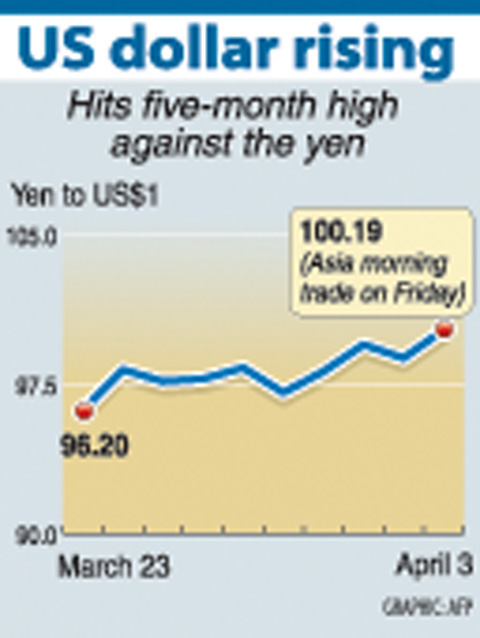The dollar topped ¥100 for the first time in five months but weakened against other major currencies on Friday as traders assessed the impact of a weak US employment on economic recovery prospects.
At 9pm GMT, the euro fetched US$1.3483 from US$1.3461 late on Thursday in New York.
The dollar meanwhile rose to ¥100.29 from ¥99.52 as investors welcomed the G20 summit pledge to step up efforts to tackle the economic crisis.

“The actions by Washington and leaders of the 20 largest economies have helped to restore risk appetite,” Kathy Lien at Global Forex Trading said.
In late New York trading, the dollar stood at 1.1301 Swiss francs from SF1.1340 on Thursday.
The pound was at US$1.4836 after US$1.4725.
Asian currencies rose for a fifth week, the longest winning streak since October 2007 in the wake of the G20 summit.
Eight of the 10 most active Asian currencies outside Japan advanced in the week after economic reports in China, the US and the UK fueled speculation that demand for regional exports will strengthen.
The Bloomberg-JPMorgan Asia Dollar Index, which tracks their performance, touched a two-month high on Thursday.
The South Korean won advanced 0.6 percent this week to 1,341.50 per dollar, according to data compiled by Bloomberg. The New Taiwan dollar climbed 1.2 percent to NT$33.38 and the Malaysian ringgit strengthened 1 percent to 3.5803.
The MSCI Asia-Pacific Index of regional equities climbed 1.4 percent during the week.
The NT dollar touched an 11-week high on Thursday before paring its advance on reported intervention. The central bank bought at least US$1.2 billion of US dollars on Thursday to counter foreign investors’ and local corporations’ purchases of the Taiwanese currency, the Taipei-based Economic Daily News said on Friday.
Elsewhere, the Singapore dollar climbed 0.6 percent this week to S$1.5051, Indonesia’s rupiah rose 0.2 percent to 11,475 and the Philippine peso gained 0.4 percent to 47.862.

The combined effect of the monsoon, the outer rim of Typhoon Fengshen and a low-pressure system is expected to bring significant rainfall this week to various parts of the nation, the Central Weather Administration (CWA) said. The heaviest rain is expected to occur today and tomorrow, with torrential rain expected in Keelung’s north coast, Yilan and the mountainous regions of Taipei and New Taipei City, the CWA said. Rivers could rise rapidly, and residents should stay away from riverbanks and avoid going to the mountains or engaging in water activities, it said. Scattered showers are expected today in central and

COOPERATION: Taiwan is aligning closely with US strategic objectives on various matters, including China’s rare earths restrictions, the Ministry of Foreign Affairs said Taiwan could deal with China’s tightened export controls on rare earth metals by turning to “urban mining,” a researcher said yesterday. Rare earth metals, which are used in semiconductors and other electronic components, could be recovered from industrial or electronic waste to reduce reliance on imports, National Cheng Kung University Department of Resources Engineering professor Lee Cheng-han (李政翰) said. Despite their name, rare earth elements are not actually rare — their abundance in the Earth’s crust is relatively high, but they are dispersed, making extraction and refining energy-intensive and environmentally damaging, he said, adding that many countries have opted to

People can preregister to receive their NT$10,000 (US$325) cash distributed from the central government on Nov. 5 after President William Lai (賴清德) yesterday signed the Special Budget for Strengthening Economic, Social and National Security Resilience, the Executive Yuan told a news conference last night. The special budget, passed by the Legislative Yuan on Friday last week with a cash handout budget of NT$236 billion, was officially submitted to the Executive Yuan and the Presidential Office yesterday afternoon. People can register through the official Web site at https://10000.gov.tw to have the funds deposited into their bank accounts, withdraw the funds at automated teller

CONCESSION: A Shin Kong official said that the firm was ‘willing to contribute’ to the nation, as the move would enable Nvidia Crop to build its headquarters in Taiwan Shin Kong Life Insurance Co (新光人壽) yesterday said it would relinquish land-use rights, or known as surface rights, for two plots in Taipei’s Beitou District (北投), paving the way for Nvidia Corp to expand its office footprint in Taiwan. The insurer said it made the decision “in the interest of the nation’s greater good” and would not seek compensation from taxpayers for potential future losses, calling the move a gesture to resolve a months-long impasse among the insurer, the Taipei City Government and the US chip giant. “The decision was made on the condition that the Taipei City Government reimburses the related